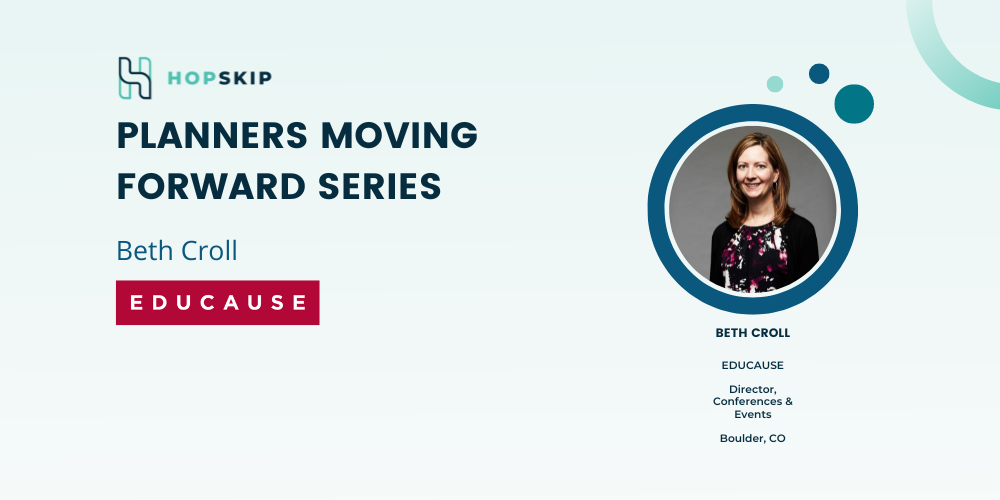This post is part of the HopSkip Planner Spotlight Series where HopSkip spotlight's planners across the industry to bring awareness of how they adapted to COVID-19, communicating and lessons learned and sharing how they are viewing the meetings and events industry in a post-pandemic world.
Name: Beth Croll
Company Name: EDUCAUSE
Job Title: Director, Conferences and Events
Years of Experience: 20+
How do you think you are positioned, after months of persevering with the pandemic, to take advantage of our new and disrupted meetings/events landscape?
There's nothing like a good crisis to make you stop and analyze all the "whys". A pet peeve of mine is doing something one way because it's always been done that way. The pandemic gave us a chance to take a step back and review all of our offerings to see if they made sense in our new landscape. For example, our evaluations have shown for years that we had too much content and our audience was overwhelmed with choices. With a smaller audience, this was the perfect time to test that theory, along with all of the other items that have been on our list. We knew that our audience would be super forgiving as we experimented returning to in person events.
As our community moves forward with planning in-person meetings, what new technologies or processes are you implementing that you may have not looked at before?
The pandemic was obviously a huge catalyst for change and we obviously made some changes there because of it - updated Code of Conduct, liability waiver to include COVID, proof of vaccination or a negative test - as conditions of registration and receiving a badge. Some of the changes mentioned above may not stick around for the next several years, but I think those that relate to general health and safety will. For instance, we took a hard look at the flow of our attendees and tried to minimize moments where they might be in large clusters. Our opening keynote was moved to later in the morning to minimize crowds forming around registration. Where space allowed, attendees had a choice sitting (or standing) in a variety of seating options to match their comfort levels. We did experiment with live streaming a handful of sessions from our Annual Conference last Fall, but we have moved away from that for the near future. We shifted our synchronous online conference to an asynchronous experience the following week. We're all aware of the complexities and costs of producing a hybrid event and we were very upfront that we were producing two distinct experiences, but one conference. As we subsequently learned, these two very different audiences have different needs and priorities and it only solidified our decision to not force them together as one.
As we see virtual meetings transition back to face to face, hybrid meetings are beginning to be the vehicle to return to normalcy. What are your thoughts on hybrid meetings versus traditional fully in-person meetings?
As I answer this question, I'd like to call out that I am specifically talking about online conferences and not a hybrid conference. I don't think hybrids work well for a variety of reasons. My opinion of online conferences is that they serve a need for accessibility - perhaps someone without the financial means to travel around the globe, a new mother, someone caring for an aging parent - and provide great work/life flexibility when it comes to learning or education. Engagement and networking are much more difficult online. This is where in-person events excel. Those serendipitous chance encounters in the hallway or moments of laughing and sharing with a colleague are what set in-person events apart. We just completed our fourth in-person event last week and with each of them, our members told us over and over how grateful and happy they were that they got to meet in person. That same level of gratitude or sentiment isn't expressed with online, but they are appreciative of the education offered.
In your opinion, what do you think the biggest value for your attendees is in regards to returning to live events?
There are so many things I could list here, but I think they all boil down to the joy and euphoria of human connection. It might be from a new connection made, reuniting with an old colleague, or sharing a meal or experience with someone. These type of activities fill our emotional tank.
As the pandemic fades away and we return to face-to-face events what do you hope changes, either for planners or hoteliers, in the traditional RFP and proposal process as a result of all of the learnings from the last 20+ months?
Understanding and flexibility has to be forefront. All of our history has been wiped away and it's like we're doing brand new events. None of us have a crystal ball to predict how we will rebound.While this doesn't relate specifically to the RFP process, hoteliers need to understand that attendees are making decisions to attend even later than before. The days of a 3-week cutoff date for housing seem very archaic when attendees decide to attend about a week prior. They find suitable housing, but often not with our block - and then the hotel and group lose out.
This post is part of the HopSkip Planner Spotlight Series where HopSkip spotlight's planners across the industry to bring awareness of how they adapted to COVID-19, communicating and lessons learned and sharing how they are viewing the meetings and events industry in a post-pandemic world.
